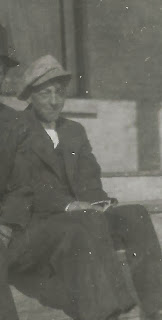Unprecedented times seems to be a phrase used often in the media and general conversations these days. Covid-19 has been top of our minds for many months and will be a memory we will have for the rest of our days when it is over. Historians and genealogists have a tendency to look back to help us make sense of the present and this post is the result of that reflection.
Four of Alex's cousins, children of his mother's brother, William Henry, died a few miles away from the epidemic of influenza earlier that same year in March of 1920. This would have been the same time that Alexander got sick. Their obituary notice below was found online from the Oak River Post.
GEORGE T., WILDRED JAMES, DELLA and EDITH HENRY
To lose four children in two days has just been the exceptionally sad
lot of Mr. and Mrs. William HENRY, the cause of death in each case being
pneumonia following influenza. George T., aged 18 years and 11 months,
and Della aged 14 years and 5 months, died less than an hour apart on
Friday morning, and Wilfred James, aged sixteen, and Edith aged eleven,
passed away early Sunday morning. The deceased were all of a robust
constitution and particularly well developed for their age, but in spite
of this and all that medical science could do for them, the disease was
of such a malignant type that they could not withstand its ravages.
The four children were buried in White Bank Lea cemetery, the former
two on Saturday forenoon and the latter two on Sunday evening, Rev. Wm.
FERGUSON officiating.
Four pleasant faces will be greatly missed from the life of our
community, and our tenderest sympathies are extended to the fond parents
in their grief.
A photo of the Henry children's weathered grave marker at White Bank Lea is below. Over 100 years has passed but the story of the short lives of these children remains carved in the stone. Their small community had already experienced such sadness, unfortunately.
 |
These stories are not shared to make anyone feel their worries of today are not justified. Times have changed but emotion has not. The eight children's stories continue to be told and remembered. The Wilson, Henry and Sinclair families carried on despite the tragedy and better days were ahead. Keeping their own household in quarantine was the only was to stop the virus while waiting for medical advances and they did. We will too. Stay safe at home, friends.



No comments:
Post a Comment